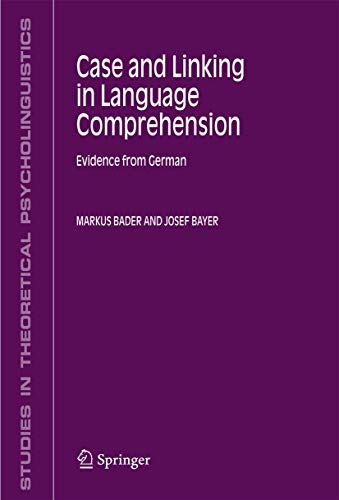Case and Linking in Language Comprehension: Evidence from German (Studies in Theoretical Psycholinguistics, 34)
Bader, Markus; Bayer, Josef
Verkäufer
Ria Christie Collections, Uxbridge, Vereinigtes Königreich
Verkäuferbewertung 5 von 5 Sternen
![]()
AbeBooks-Verkäufer seit 25. März 2015
Beschreibung
Beschreibung:
In. Bestandsnummer des Verkäufers ria9789048171118_new
Inhaltsangabe:
German is a language which has received a lot of attention in linguistics, and data from German had a substantial in?uence on the formation of linguistic theory. The in?uence this language had so far on psycholinguistics and on s- tactic processing in particular is much more limited, although the last 10 years have seen a growing interest in psycholinguistic investigations of German. The present monograph will build on earlier work and develop it further toward an account of syntactic comprehension on the basis of theoretical as well as - perimental investigations. The verb-?nal nature, the free order of constituents, and the morphological Case system of German offer a rich domain for exp- rations which will be shown to reshape our knowledge about human sentence processing in general. Much of the research which led to this monograph has been carried out at theFriedrichSchiller UniversityJenaandhasbeenconcluded atKonstanzU- versity. Our research has been supported between 1997 and 2005 by grant Ba 1178/4 of the Deutsche Forschungsgemeinschaft (DFG) under the title L- guage Comprehension and Variable Word Order - Syntactic and Extrasyntactic Factors in Processing German Sentences. We are indebted to the DFG for this continuous support over the years, and in particular to Dr. Manfred Briegel and Dr. Susanne Anschütz for their administrative help.
Über die Autorin bzw. den Autor:
Markus Bader is Associate Professor of Linguistics at the University of Konstanz. He specializes in human language processing with an emphasis on syntax. He was formerly at the University of Jena and has been a visiting professor at the University of Massachusetts, Amherst and is widely known for his work on the processing of German.
Josef Bayer is Professor of Linguistics at the University of Konstanz. His specialization is mainly in syntactic theory, and comparative linguistics, Germanic and South-Asian. He was formerly at the University of Jena and has held positions in research centers in Germany and in the Netherlands.
Bibliografische Details
Titel: Case and Linking in Language Comprehension: ...
Verlag: Springer
Erscheinungsdatum: 2010
Einband: Softcover
Zustand: New
Beste Suchergebnisse beim ZVAB
Case and Linking in Language Comprehension : Evidence from German
Anbieter: AHA-BUCH GmbH, Einbeck, Deutschland
Taschenbuch. Zustand: Neu. Druck auf Anfrage Neuware - Printed after ordering - The Germanlanguage, due to its verb-final nature, relatively free order of constituents and morphological Case system, poses challenges for models of human syntactic processing which have mainly been developed on the basis of head-initial languages with little or no morphological Case. The verb-final order means that the parser has to make predictions about the input before receiving the verb. What are these predictions What happens when the predictions turn out to be wrong Furthermore, the German morphological Case system contains ambiguities. How are these ambiguities resolved under the normal time pressure in comprehension Based on theoretical as well as experimental work, the present monograph develops a detailed account of the processing steps that underly language comprehension. At its core is a model of linking noun phrases to arguments of the verb in the developing phrase structure and checking the result with respect to features such as person, number and Case. This volume contains detailed introductions to human syntactic processing as well as to German syntax which will be helpful especially for readers less familiar with psycholinguistics and with Germanic. Artikel-Nr. 9789048171118
Anzahl: 1 verfügbar
Case and Linking in Language Comprehension: Evidence from German (Studies in Theoretical Psycholinguistics)
Anbieter: Revaluation Books, Exeter, Vereinigtes Königreich
Paperback. Zustand: Brand New. reprint edition. 333 pages. 8.78x5.98x0.76 inches. In Stock. Artikel-Nr. x-9048171113
Anzahl: 2 verfügbar

